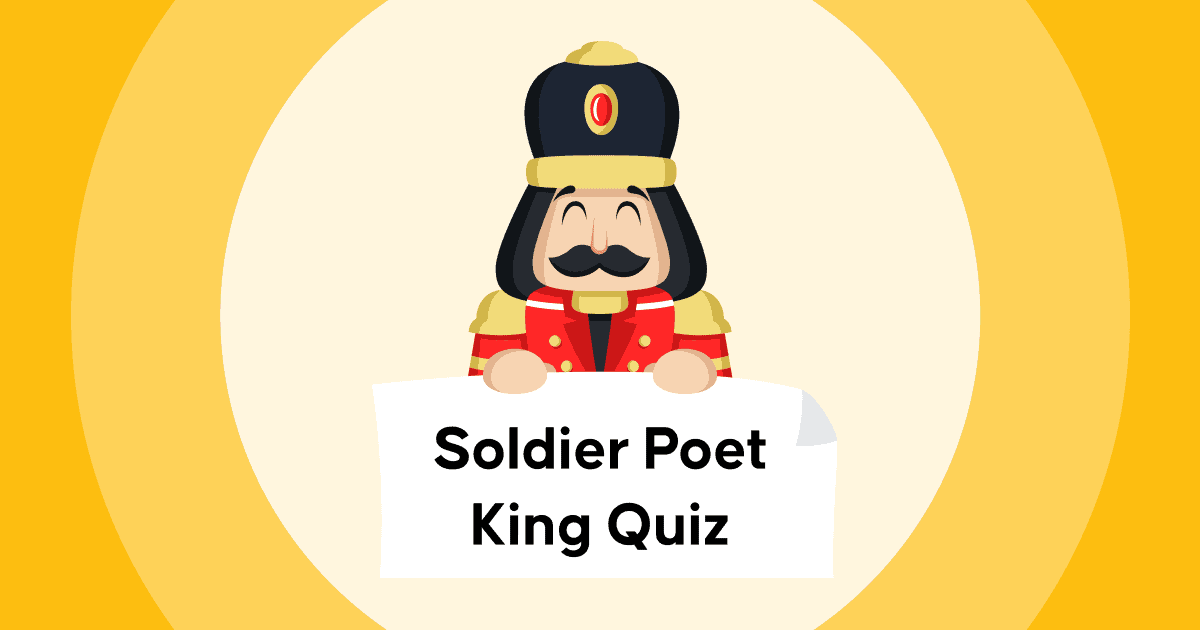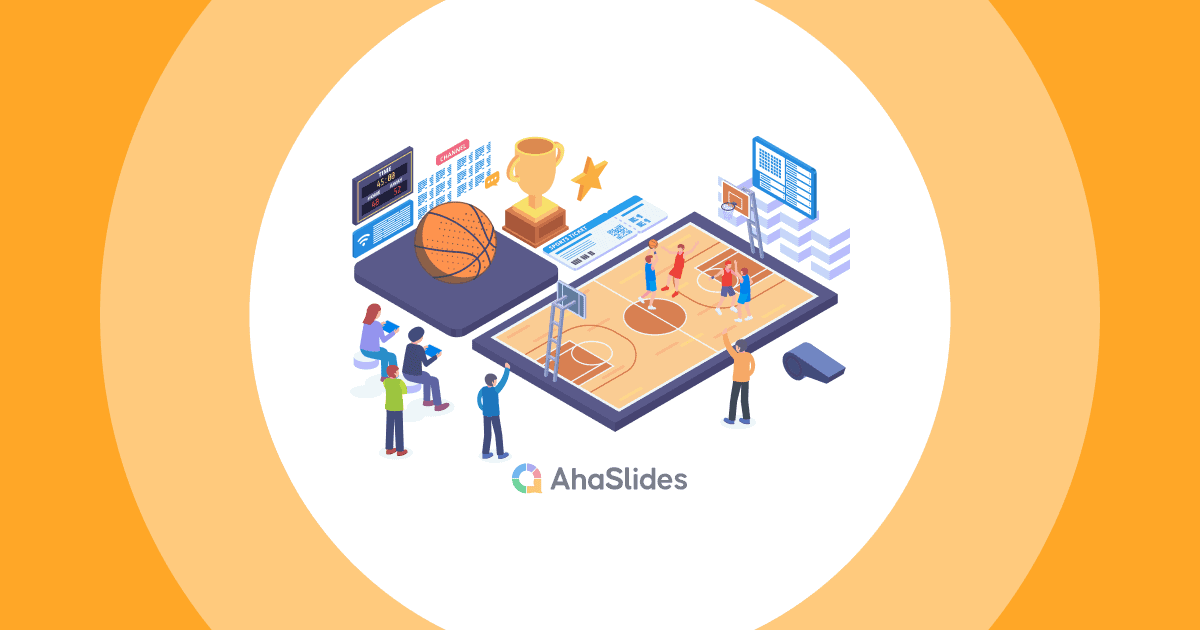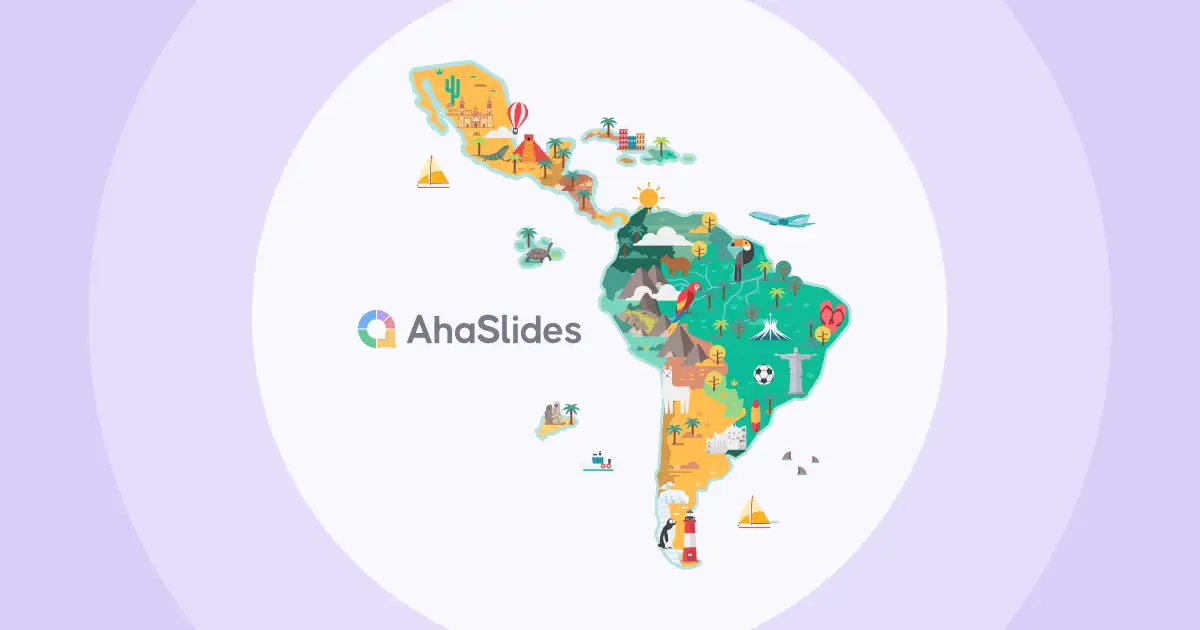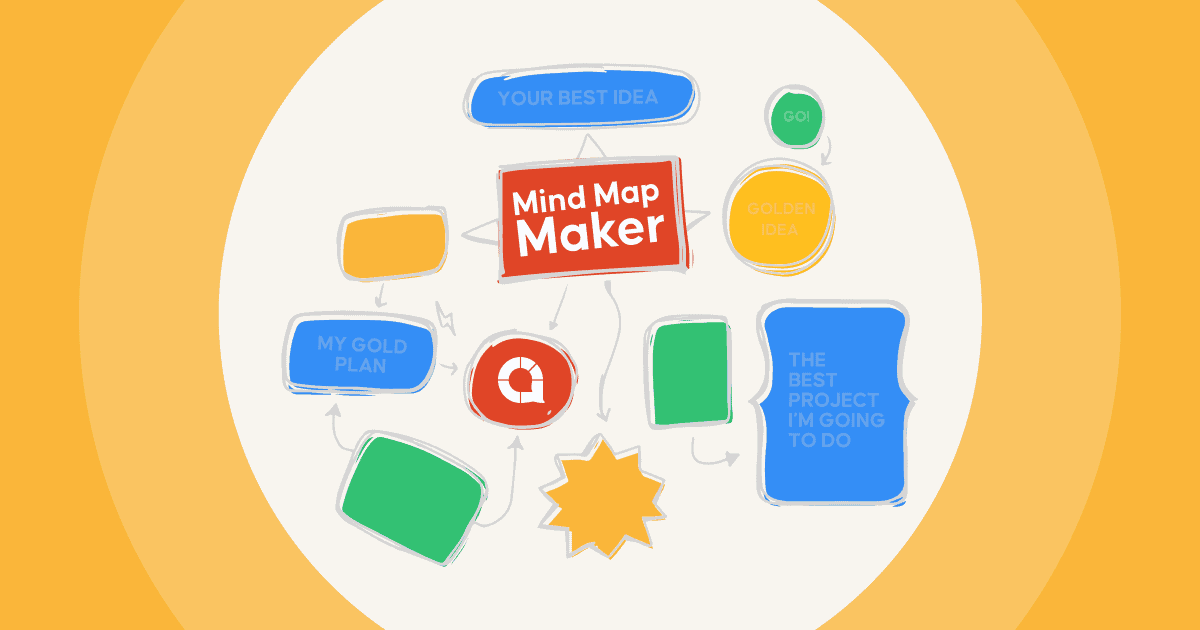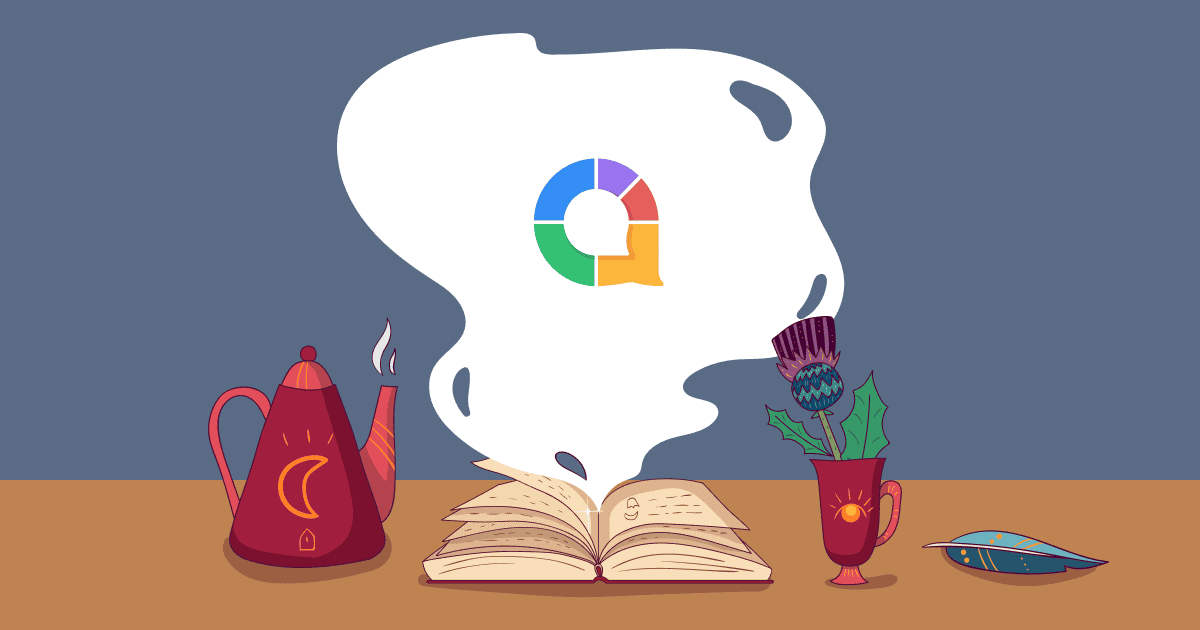We are Not Really Strangers to gra polegająca na ponownym nawiązaniu kontaktu, która pozwoli ci przeżyć pełen emocji wieczór gier lub zagrać z bliskimi, aby pogłębić waszą relację. Poniżej znajdziesz pełną listę, z której możesz korzystać ZA DARMO!
To dobrze wykonana gra trzypoziomowa, która obejmuje wszystkie aspekty randek, par, miłości do siebie, przyjaźni i rodziny. Ciesz się podróżą pogłębiania swoich więzi!

TL; DR
- Gra „We're Not Really Strangers” (WNRS) to nie tylko talia pytań; to także gra, która tworzy wartościowe doświadczenia, sprzyjające głębszym rozmowom i zacieśnianiu więzi.
- Pomysłodawcą WNRS jest Koreen Odiney, modelka i artystka z Los Angeles, której pragnieniem jest tworzenie autentycznych i szczerych relacji.
- Struktura gry z pytaniami 3-poziomowymi, w tym Perception, Connection i Reflection. Istnieje wiele dodatkowych edycji lub pakietów rozszerzeń, które odpowiadają konkretnym relacjom, takim jak pary, rodzina lub przyjaciele.
- Podstawy naukowe pytań WNRS opierają się na formułowaniu właściwych pytań oraz na zasadach psychologicznych, takich jak inteligencja emocjonalna (EQ), lęk społeczny i zdrowie psychiczne.
- Uzyskaj dostęp do bezpłatnej wersji pytań WNRS lub fizycznych kart do gry na oficjalnej stronie marki, u innych sprzedawców zewnętrznych lub na internetowych platformach sprzedażowych.
Spis treści
Czym jest „Nie jesteśmy naprawdę obcymi”?
W świecie różnych lekkich konwersacji gra We're Not Really Strangers wyróżnia się jako podróż w głębokie połączenia. Nie zmienia sposobu, w jaki gramy w gry, ale na nowo definiuje sposób, w jaki łączymy się z innymi i z samymi sobą.
Jakie jest więc jego pochodzenie i koncepcja?
Twórcą WNRS jest Koreen Odiney, modelka i artystka z Los Angeles. Fraza „We're Not Really Strangers” pochodzi od nieznajomego, którego spotkała podczas sesji fotograficznych. Gra karciana zrodziła się z jej pasji do przełamywania barier i nawiązywania znaczących połączeń.
Gra zawiera różne prowokujące do myślenia pytania na 3 progresywnych poziomach: Perception, Connection i Reflection. Istnieją specjalne edycje lub pakiety rozszerzeń, takie jak pary, rodzina i przyjaźń, aby zapewnić większe doświadczenie intymności.
Dlaczego WNRS to coś więcej niż zwykła gra karciana?
Zamiast skupiać się na rywalizacji, gra tworzy znaczącą przestrzeń i doświadczenie. Z różnymi przemyślanymi tak naprawdę nie jesteśmy sobie obcy Dzięki pytaniom stopniowo wkraczasz w świat odkrywania siebie i autentycznych relacji.
Marka zaprojektowała również ostatnią kartę, na której gracze mogą napisać do siebie wiadomości, co dodaje grze trwałego wrażenia.
Jak stało się to globalną sensacją
Dzięki unikalnemu podejściu do autentycznego połączenia gra zyskała wirusowy rozpęd. Głęboko rezonuje z odbiorcami poszukującymi autentyczności w cyfrowym świecie z mniejszą interakcją społeczną.
Co więcej, siła przekazu ustnego i treści w mediach społecznościowych sprawia, że szybko staje się wirusowa jako globalne zjawisko. Marka oferuje również różne edycje lub pakiety tematyczne, aby sprostać różnym typom relacji, zapewniając satysfakcjonujące doświadczenie.
Jak grać w „We're Not Really Strangers”
Gotowy przełamać bariery i zanurzyć się w prawdziwych więziach? Przyjrzyjmy się prostym krokom, aby zagrać w „We're Not Really Strangers”!
1. Przygotowanie gry i wymagane materiały
Do przygotowania gier potrzebne będą następujące materiały:
- Talie kart „We're Not Really Strangers” ze wszystkimi 3-poziomowymi pytaniami. Możesz wykorzystać pakiety rozszerzeń, aby dostosować je do odpowiednich odbiorców docelowych.
- Ołówek i notatnik na ostatnią czynność polegającą na podsumowaniu lub napisaniu wiadomości do siebie nawzajem.
- Odpowiednia i cicha przestrzeń, w której wszyscy uczestnicy będą mogli swobodnie dzielić się swoimi przemyśleniami
Po zebraniu niezbędnych materiałów potasuj każdą z talii kart i umieść je w oddzielnych stosach. Nie zapomnij odłożyć ostatniej karty na bok, aby użyć jej na koniec gry.
Jeśli chodzi o uczestników, możesz łatwo rozpocząć grę z dwoma graczami. Kto zacznie pierwszy? Zdecydujcie, patrząc na siebie; pierwsza osoba, która mrugnie, zaczyna! Możesz grać ze znajomymi, rodziną, a nawet nieznajomymi. Prosimy pamiętać, że gracze są zachęcani do otwartego i szczerego dzielenia się.
2. Zrozumienie poziomów i typów pytań
Teraz czas zrozumieć poziomy gry! Zazwyczaj są 3 poziomy pytań, aby stopniowo pogłębiać grę:
- Poziom 1: Percepcja – skup się na przełamywaniu lodów, tworzeniu założeń i badaniu pierwszych wrażeń
- Poziom 2: Połączenie – zachęcaj do dzielenia się osobistymi doświadczeniami, perspektywami życiowymi i emocjami
- Poziom 3: Refleksja – promowanie głębokiej refleksji nad własnymi doświadczeniami gracza i doświadczeniami innych osób podczas gry.
3. Jak sprawić, by gra była bardziej angażująca
Przejdź do eksploracji przydatnych wskazówek, aby ulepszyć swoje doświadczenie WNRS. Dlaczego nie rozważysz niektórych z poniższych sugestii?
Pamiętaj o stworzeniu przytulnej i bezpiecznej przestrzeni. Bezstronna atmosfera ze świecami, przekąskami i muzyką sprawia, że gracze czują się swobodnie i mogą się otworzyć.
Nie spiesz się! Pozwól rozmowie płynąć naturalnie. Poświęć czas na każde pytanie i słuchaj aktywnie z prawdziwym zainteresowaniem.
Możesz wykorzystać WildCards w kilku kreatywnych wyzwaniach, aby dodać grze dynamicznego charakteru.
4. Gra wirtualna kontra gra na żywo
Zastanawiasz się, jak grać w gry WNRS w różnych sceneriach? Nie pomijaj tej części! Rzeczywiście, możesz grać osobiście lub wirtualnie bez kompromisów.
- Gra osobista: Fizyczne talie są idealne do podnoszenia poziomu doświadczenia. Bardziej bezpośrednia interakcja między ludźmi, taka jak język ciała i kontakt wzrokowy, wywołuje większy wpływ emocjonalny. Zbierz graczy wokół stołu i rozpocznij grę zgodnie ze standardowymi zasadami!
- Gra wirtualna: Gra WNRS online działa dobrze za pośrednictwem połączeń wideo, takich jak Zoom lub Facetime, dla znajomych z daleka lub członków zdalnych. Każdy gracz na zmianę udostępnia każdą kartę online.
Ale co, jeśli potrzebujesz platformy lub aplikacji WNRS, aby gra była przyjemna i angażująca? Rozważmy AhaSlides — najskuteczniejszą interaktywną platformę prezentacyjną, która umożliwia tworzenie interaktywnych i zabawnych quizów lub innych funkcji. Oto szablon dla AhaSlides dla pytań online We're Not Really Strangers:
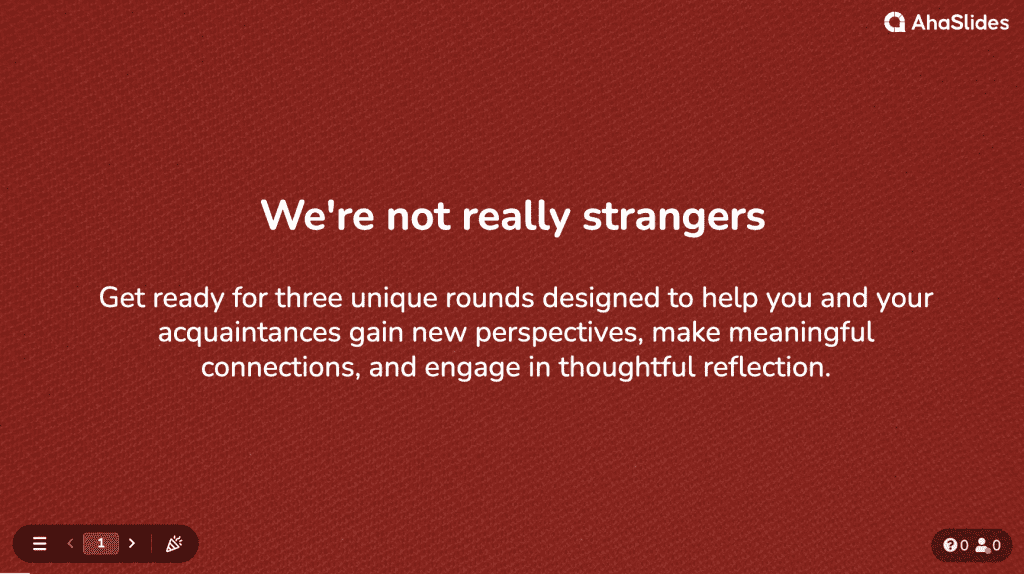
- #1: Kliknij powyższy przycisk, aby dołączyć do gry. Możesz przeglądać każdy slajd i przesyłać pomysły znajomym.
- #2: Aby zapisać slajdy lub odtwarzać je prywatnie ze znajomymi, kliknij „Moje konto”, a następnie zarejestruj się, aby uzyskać bezpłatne konto AhaSlides. Możesz je dalej dostosowywać i odtwarzać online/offline z osobami, jak chcesz!
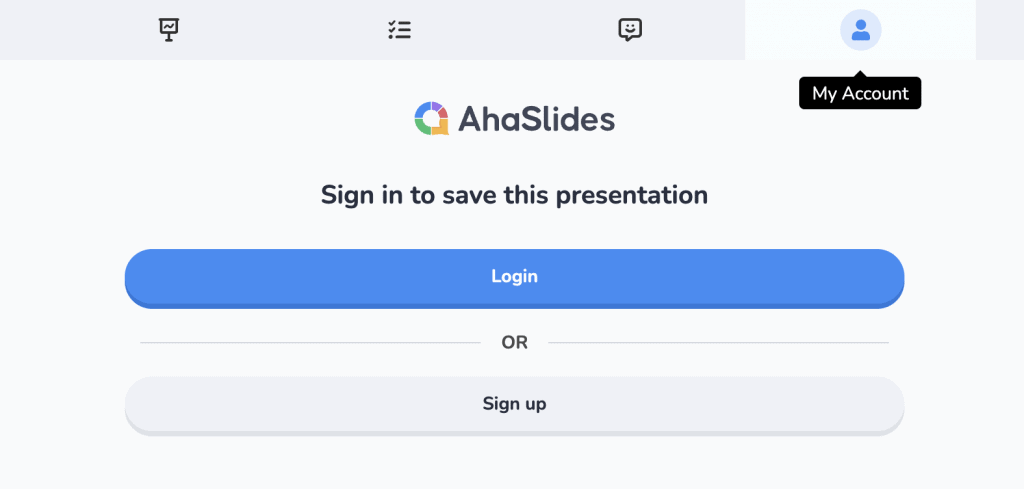
Pełna lista pytań „Naprawdę nie jesteśmy obcymi” (aktualizacja 2025)
Zacznijmy od pytań powierzchownych i głębokich. Nie jesteśmy naprawdę obcymi. Ty i twoi znajomi doświadczycie trzech odrębnych rund służących różnym celom: percepcji, połączeniu i refleksji.
Poziom 1: Percepcja
Poziom ten koncentruje się na autorefleksji i zrozumieniu własnych myśli i uczuć. Poprzez dzielenie się spostrzeżeniami uczestnicy zyskują wgląd w to, jak widzą ich inni. Są świadomi pochopnych osądów i bardziej empatyczni poprzez zrozumienie innych soczewek.
Oto kilka najlepszych pytań, które mogą Ci się przydać, aby przełamać lody:
1/ Jak myślisz, jaki jest mój kierunek studiów?
2/ Czy myślisz, że kiedykolwiek byłem zakochany?
3/ Czy myślisz, że kiedykolwiek miałem złamane serce?
4/ Czy myślisz, że kiedykolwiek zostałem zwolniony?
5/ Czy myślisz, że byłem popularny w szkole średniej?
6/ Jak myślisz, co wolę? Hot Cheetos czy krążki cebulowe?
7/ Czy myślisz, że lubię być kanapowcem?
8/ Czy uważasz, że jestem ekstrawertykiem?
9/ Czy myślisz, że mam rodzeństwo? Starszy czy młodszy?
10/ Jak myślisz, gdzie dorastałem?
11/ Myślisz, że głównie gotuję lub jem na wynos?
12/ Jak myślisz, co ostatnio oglądałem?
13/ Myślisz, że nienawidzę wcześnie wstawać?
14/ Jaka jest najmilsza rzecz, jaką pamiętasz dla przyjaciela?
15/ W jakiej sytuacji społecznej czujesz się najbardziej niezręcznie?
16/ Jak myślisz, kto jest moim ulubionym idolem?
17/ Kiedy zwykle jem obiad?
18/ Myślisz, że lubię ubierać się na czerwono?
19/ Jak myślisz, jakie jest moje ulubione danie?
20/ Myślisz, że jestem w greckim życiu?
21/ Czy wiesz, jaka jest moja wymarzona kariera?
22/ Czy wiesz, gdzie są moje wymarzone wakacje?
23/ Czy myślisz, że kiedyś byłem prześladowany w szkole?
24/ Czy uważasz, że jestem rozmowny?
25/ Czy myślisz, że jestem zimną rybą?
26/ Jak myślisz, jaki jest mój ulubiony napój Starbucks?
27/ Myślisz, że kocham czytać książki?
28/ Jak myślisz, kiedy najczęściej lubię zostawać sam?
29/ Jak myślisz, która część domu jest moim ulubionym miejscem?
30/ Czy myślisz, że lubię grać w gry wideo?
Poziom 2: Połączenie
Na tym poziomie gracze zadają sobie prowokujące do myślenia pytania, budując głębszą więź i empatię.
Wrażliwość jest tutaj kluczowa. Poczucie zaufania i intymności często wynika z otwartego i szczerego dzielenia się osobistymi doświadczeniami. Wrażliwość przerywa wówczas rozmowy na poziomie powierzchniowym i wzmacnia relacje. A oto pytania, które należy zadać, aby nawiązać głębsze więzi:
31/ Jak myślisz, jakie jest prawdopodobieństwo, że zmienię swoją karierę?
32/ Jakie było twoje pierwsze wrażenie na mój temat?
33/ Jaka jest ostatnia rzecz, o której skłamałeś?
34/ Co ukrywałeś przez te wszystkie lata?
35/ Jakie jest twoje najdziwniejsze myślenie?
36/ Jaka jest ostatnia rzecz, o której okłamałeś swoją mamę?
37/ Jaki jest największy błąd, jaki popełniłeś?
38/ Jaki był najgorszy ból, jaki kiedykolwiek odczuwałeś?
39/ Co wciąż próbujesz sobie udowodnić?
40/ Jaka jest twoja najbardziej definiująca osobowość?
41/ Co jest najtrudniejsze w randkowaniu z tobą?
42/ Co jest najlepsze w twoim ojcu lub matce?
43/ Jaki jest ulubiony tekst, o którym nie możesz przestać myśleć?
44/ Czy okłamujesz siebie w jakiejś sprawie?
45/ Jakie zwierzę chcesz hodować?
46/ Co najlepiej byłoby w pełni zaakceptować w obecnym stanie?
47/ Kiedy ostatnio czułeś się szczęśliwy będąc sobą?
48/ Jaki jest przymiotnik, który najlepiej opisuje cię w przeszłości i teraz?
49/ W co twoje młodsze ja nie uwierzyłoby w swoim dzisiejszym życiu?
50/ Którą część rodziny chcesz zatrzymać lub zwolnić?
51/ Jakie jest twoje ulubione wspomnienie z dzieciństwa?
52/ Jak długo trwa przyjaźń z tobą?
53/ Co sprawia, że ktoś z przyjaciela staje się dla ciebie najlepszym przyjacielem?
54/ Na jakie pytanie próbujesz teraz odpowiedzieć w swoim życiu?
55/ Co byś powiedział młodszemu sobie?
56/ Jakiego czynu najbardziej żałujesz?
57/ Kiedy ostatnio płakałeś?
58/ W czym jesteś lepszy niż większość ludzi, których znasz?
59/ Z kim chcesz porozmawiać, kiedy czujesz się samotny?
60/ Co jest najtrudniejsze w byciu za granicą?
Poziom 3: Odbicie
Ostatni poziom zachęca graczy do refleksji nad doświadczeniem i spostrzeżeniami zdobytymi podczas gry. Chodzi o lepsze zrozumienie siebie i innych, na przykład tego, jak się czują lub wchodzą w interakcje z innymi. Innymi słowy, te pytania odwołują się do inteligencji emocjonalnej dotyczącej empatii i samoświadomości. Ponadto proces refleksji pozostawi poczucie zamknięcia i jasności.
Teraz sprawdź kilka pytań do autorefleksji WNRS:
61/ Co chcesz teraz zmienić w swojej osobowości?
62/ Komu najbardziej chcesz przeprosić lub podziękować?
63/ Gdybyś stworzył dla mnie playlistę, jakie 5 piosenek by się na niej znalazło?
64/ Co mnie zaskoczyło?
65/ Jak myślisz, jaka jest moja supermoc?
66/ Czy uważasz, że mamy jakieś podobieństwa lub różnice?
67/ Jak myślisz, kto może być moim właściwym partnerem?
68/ Co muszę przeczytać, gdy tylko będę miał czas?
69/ Gdzie mam największe kwalifikacje do udzielania porad?
70/ Czego dowiedziałeś się o sobie grając w tę grę?
71/ Na jakie pytanie najbardziej bałeś się odpowiedzieć?
72/ Dlaczego „stowarzyszenie” jest nadal ważne w życiu studenckim?
73/ Jaki byłby dla mnie idealny prezent?
74/ Jaką część siebie we mnie widzisz?
75/ Opierając się na tym, czego się o mnie dowiedziałeś, co sugerujesz, żebym przeczytał?
76/ Co byś o mnie zapamiętał, gdy nie będziemy już w kontakcie?
77/ Z tego co o mnie słyszałem, jaki film z Netflixa polecacie mi obejrzeć?
78/ W czym mogę Ci pomóc?
79/ Jak Sigma Kappa nadal wpływa na Twoje życie?
80/ Czy możesz tolerować kogoś, kto cię skrzywdził)?
81/ Co muszę teraz usłyszeć?
82/ Czy odważyłbyś się zrobić coś poza swoją strefą komfortu w przyszłym tygodniu?
83/ Czy myślisz, że ludzie pojawiają się w twoim życiu z jakiegoś powodu?
84/ Jak myślisz, dlaczego się spotkaliśmy?
85/ Jak myślisz, czego najbardziej się boję?
86/ Jaką lekcję wyciągniesz z czatu?
87/ Co według ciebie powinienem odpuścić?
88/ Przyznaj się do czegoś
89/ Co ze mną prawie nie rozumiesz?
90/ Jak opisałbyś mnie nieznajomemu?
Dodatkowa zabawa: Dzikie karty
Ta część ma na celu uczynienie gry z pytaniami bardziej ekscytującą i wciągającą. Zamiast zadawać pytania, jest to rodzaj instrukcji działania, którą gracze, którzy ją losują, muszą ją wykonać. Oto 10:
91/ Narysuj razem obrazek (60 sekund)
92/ Opowiedzcie razem historię (1 minuta)
93/ Napisz do siebie wiadomość i przekaż ją sobie nawzajem. Otwórz je, gdy już wyjdziesz.
94/ Zróbcie sobie razem selfie
95/ Utwórz własne pytanie na dowolny temat. Niech to się liczy!
96/ Patrzcie sobie w oczy przez 30 sekund. Co zauważyłeś?
97/ Pokaż swoje zdjęcie z dzieciństwa (nago)
98/ Zaśpiewaj ulubioną piosenkę
99/ Powiedz drugiej osobie, żeby zamknęła oczy i trzymała je zamknięte (odczekaj 15 sekund i pocałuj ją)
100/ Napisz notatkę dla młodszych siebie. Po 1 minucie otwórz i porównaj.
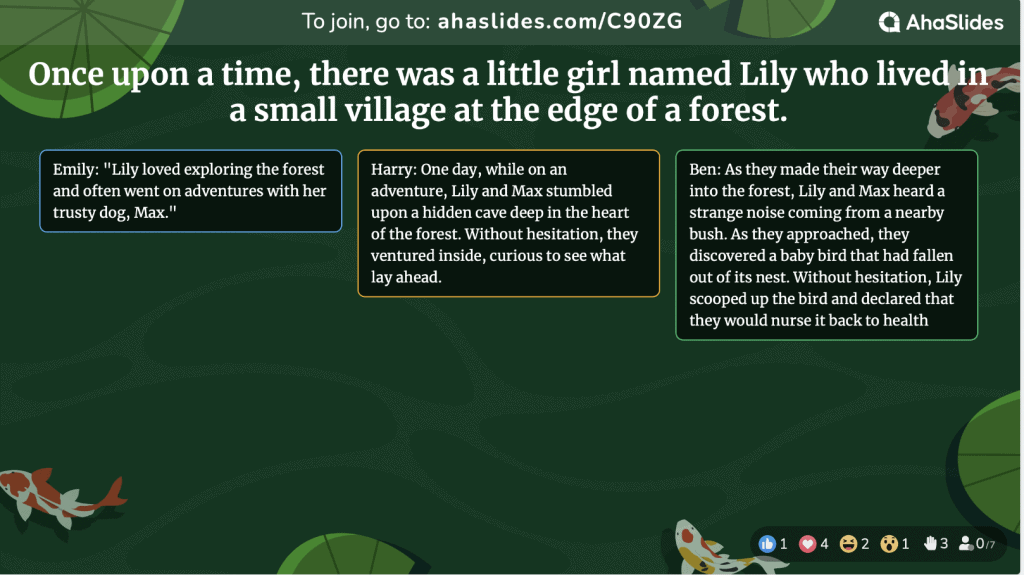
Edycje specjalne i pakiety rozszerzeń
Potrzebujesz więcej pytań „Nie jesteśmy naprawdę obcymi”? Oto kilka dodatkowych pytań, które możesz zadać w różnych związkach, od randek, miłości do siebie, przyjaźni i rodziny po miejsce pracy.
10 pytań typu „Nie jesteśmy naprawdę obcymi ludźmi” – wydanie dla par
101/ Jak myślicie, co będzie idealne na Wasz ślub?
102/ Co sprawiłoby, że poczułbyś się bliżej mnie?
103/ Czy chcesz mnie kiedyś zostawić?
104/Ile chcesz mieć dzieci?
105/ Co możemy razem stworzyć?
106/ Myślisz, że nadal jestem dziewicą?
107/ Jaka jest we mnie najbardziej atrakcyjna cecha, która nie jest fizyczna?
108/ Jaka jest historia o tobie, której nie mogę przegapić?
109/ Jak myślisz, jaka byłaby moja idealna randka?
110/ Myślisz, że nigdy nie byłem w związku?
10 pytań „Nie jesteśmy naprawdę obcymi ludźmi” – edycja „Przyjaźń”
111/ Jak myślisz, jaka jest moja słabość?
112/ Jak myślisz, jaka jest moja siła?
113/ Jak myślisz, co powinienem o sobie wiedzieć, czego być może jestem świadomy?
114/ W jaki sposób nasze osobowości się uzupełniają?
115/ Co najbardziej we mnie podziwiasz?
116/ Jednym słowem opisz jak się teraz czujesz!
117/ Jaka moja odpowiedź cię rozpaliła?
118/ Czy mogę ci zaufać, że powiesz coś prywatnego?
119/ O czym teraz za dużo myślisz?
120/ Czy myślisz, że dobrze całuję?
10 pytań typu „Nie jesteśmy naprawdę obcymi ludźmi” – edycja Workplace
121/ Z jakiego osiągnięcia zawodowego jesteś najbardziej dumny i dlaczego?
122/ Opowiedz o sytuacji, w której stałeś przed poważnym wyzwaniem w pracy i jak je przezwyciężyłeś.
123/ Jaka umiejętność lub siła, którą posiadasz, nie jest w pełni wykorzystywana w Twojej obecnej roli?
124/ Zastanawiając się nad swoją karierą, jaka była najcenniejsza lekcja, której się do tej pory nauczyłeś?
125/ Opisz cel związany z pracą lub aspiracje na przyszłość.
126/ Podziel się mentorem lub współpracownikiem, który miał znaczący wpływ na Twój rozwój zawodowy i dlaczego.
127/ Jak radzisz sobie z równowagą między życiem zawodowym a prywatnym i utrzymujesz dobre samopoczucie w wymagającym środowisku pracy?
128/ Jaka jest jedna rzecz, o której Twoim zdaniem Twoi koledzy z drużyny lub koledzy nie wiedzą o Tobie?
129/ Opisz moment, w którym poczułeś silne poczucie pracy zespołowej lub współpracy w swoim miejscu pracy.
130/ Zastanawiając się nad swoją obecną pracą, jaki jest najbardziej satysfakcjonujący aspekt Twojej pracy?
10 pytań typu „Nie jesteśmy naprawdę obcymi ludźmi” – wydanie rodzinne
131/ Co cię dziś najbardziej ekscytuje?
132/ Jaka była najlepsza zabawa, jaką kiedykolwiek miałeś?
133/ Jaka jest najsmutniejsza historia, jaką kiedykolwiek słyszałeś?
134/ Co od dawna chciałeś mi powiedzieć?
135/ Dlaczego tak długo mówisz mi prawdę?
136/ Czy myślisz, że jestem osobą, z którą możesz porozmawiać?
137/ Jakie zajęcia chcesz ze mną robić?
138/ Jaka jest najbardziej niewytłumaczalna rzecz, jaka ci się kiedykolwiek przydarzyła?
139/ Jaki jest twój dzień?
140/ Jak myślisz, kiedy jest najlepszy czas, aby porozmawiać o tym, co ci się przydarzyło?
Nauka za grą: Dlaczego WNRS działa
Tylko talia pytań, co stoi za sukcesem pytań We're Not Really Strangers? Poprzez celowy projekt, zasady psychologiczne czy inne? Przewińmy w dół, aby przyjrzeć się bliżej nauce stojącej za grą!
Siła zadawania właściwych pytań
Zamiast skupiać się wyłącznie na uzyskiwaniu odpowiedzi, gra WNRS zaprojektowała prowokujące do myślenia pytania dla samopoznania, wzajemnego zrozumienia i zmieniających życie momentów. Od pytań przełamujących lody po pytania introspekcyjne, gra zapewnia graczom poczucie bezpieczeństwa, aby stopniowo otwierali się i angażowali w relacje z innymi.
Jak emocjonalna wrażliwość buduje silniejsze więzi
Wrażliwość jest sednem emocjonalnej intymności. Dołączenie do gry WNRS pozwala graczom dzielić się, uczyć się od innych i uczyć się na nowo. W ten sposób sygnalizują zaufanie, normalizują emocje i pielęgnują empatię w celu budowania silniejszych połączeń.
Korzyści psychologiczne płynące z gry
Oprócz budowania silnych więzi, WNRS przynosi wiele korzyści w zakresie zdrowia psychicznego i psychologii, takich jak poprawa inteligencji emocjonalnej (EQ), przełamywanie barier społecznych, łagodzenie stresu i rozwój osobisty.
Dzięki pytaniom refleksyjnym możesz zwiększyć samoświadomość i empatię, które są ważnymi elementami EQ. Ponadto autentyczność, strefa bezpieczeństwa i dobre połączenia działają jako psychologiczna kotwica redukująca stres i lęk społeczny.
Ponadto, introspekcyjne podpowiedzi mogą okazać się momentami zmieniającymi życie, pozwalającymi lepiej poznać siebie, zrozumieć siebie i rozwinąć się osobiście.
Holt-Lunstad J. Połączenia społeczne jako czynnik krytyczny dla zdrowia psychicznego i fizycznego: dowody, trendy, wyzwania i przyszłe implikacje. World Psychiatry. 2024 Oct;23(3):312-332. doi: 10.1002/wps.21224. PMID: 39279411; PMCID: PMC11403199.
Dostosowywanie „Nie jesteśmy naprawdę obcymi” do Twoich potrzeb
Oto jak możesz spersonalizować grę WNRS!
Tworzenie własnych pytań
Zanim dostosujesz pytania, zadaj sobie pytanie: „Jakie połączenia chcę pielęgnować?”. Na podstawie konkretnych relacji lub wydarzeń odpowiednio utworzysz odpowiednie pytania.
Ponadto, skorzystaj z dodatkowych wydań i tematów, aby uzyskać więcej pomysłów na właściwe pytania. Nie zapomnij wykorzystać Wildcard i podpowiedzi lub cytatów, aby gra była angażująca i znacząca.
Alternatywne gry o podobnych koncepcjach
Podobają Ci się pytania z cyklu We're Not Really Stranger, ale chcesz zgłębić je bardziej; poniżej znajdziesz kilka świetnych alternatyw opartych na podobnych koncepcjach:
- Tematy tabel:Gra w rozpoczynanie konwersacji z różnymi pytaniami do przełamania lodów i głębokich refleksji. Pomysły na rodzinne obiady lub spotkania towarzyskie.
- Wielka rozmowa:W tej grze pytania nie są istotne, a jedynie luźne pogawędki, a zamiast tego przechodzi się bezpośrednio do głębokiej i znaczącej rozmowy.
- Zanurzmy się głęboko: Pierwotnie dla par do gry z pytaniami 3-poziomowymi: Icebreaker, Deep i Deeper. Jednak może być dostosowana do gry innych uczestników.
Łączenie z innymi tematami do rozpoczęcia rozmowy
Aby uzyskać bardziej dynamiczne i angażujące doświadczenie, możesz łączyć pytania z cyklu We're Not Really Strangers z innymi pytaniami ułatwiającymi rozpoczęcie konwersji.
Możesz łączyć podpowiedzi z innych gier, aby urozmaicić zakres pytań. W przeciwnym razie połącz grę WNRS z aktywnościami takimi jak rysowanie, pisanie dziennika lub wieczory filmowe, aby wszyscy skupili się na tym samym temacie. Co ciekawe, możesz zintegrować aplikację We're Not Really Stranger lub edycję cyfrową z kartami fizycznymi, aby uzyskać więcej interaktywnych funkcji i nowych podpowiedzi.
Wersje pytań WNRS do druku i w formacie PDF (bezpłatne pobieranie)
We're Not Really Strangers (WNRS) oferuje bezpłatne pliki PDF do pobrania swoich wydań wyłącznie cyfrowych na swojej oficjalnej stronie internetowej. Istnieją różne wydania, które zaspokoją Twoje wyjątkowe potrzeby, takie jak Self-Exploration Pack, Back to School Edition, Introspective Journal i inne.
Pobierz bezpłatne pytania do gry We're Not Really Stranger w wersji PDF w tym miejscu!
Aby stworzyć własne karty WNRS DIY, możesz wydrukować te bezpłatne pliki PDF i pociąć je na pojedyncze karty. Alternatywnie możesz stworzyć pytania inspirowane formatem WNRS i wydrukować je na papierze kartonowym.
Najczęściej zadawane pytania
Jaka jest ostatnia karta w Nie jesteśmy naprawdę obcy?
Ostatnia karta gry karcianej Nie jesteśmy naprawdę nieznajomymi wymaga napisania notatki dla partnera i otwarcia jej dopiero po rozstaniu się.
Jaka jest alternatywa, jeśli tak naprawdę nie jesteśmy sobie obcy?
Możesz zagrać w gry z pytaniami, takie jak Nigdy w życiu nie miałem, 2 prawdy i 1 kłamstwo, Wolisz to czy tamto, Kim jestem...
Referencje
- Holt-Lunstad J. Połączenia społeczne jako czynnik krytyczny dla zdrowia psychicznego i fizycznego: dowody, trendy, wyzwania i przyszłe implikacje. World Psychiatry. 2024 Oct;23(3):312-332. doi: 10.1002/wps.21224. PMID: 39279411; PMCID: PMC11403199. https://www.ncbi.nlm.nih.gov/books/NBK64939/
- Wiadomości IU. Silniejsze sieci społecznościowe są kluczem do rozwiązania problemów ze zdrowiem psychicznym u młodych dorosłych, wynika z badań. https://news.iu.edu/live/news/33803-stronger-social-networks-key-to-addressing-mental.

